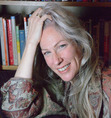Ren Powell's Blog, page 26
November 22, 2021
A Surprising Joy
I find it funny that my shrink refers to a specific work-related event of last year as “the trauma”. I mean, considering my childhood, my mother’s recent death and other serious, personal challenges of the past 2 years, it seems an odd thing to focus on as a trigger. But then yesterday: here we go again. I am looking at this latest bit of contention as a kind of work-in-progress evaluation to see if I have become stronger these past months. If not stronger, then more like a duck.
I slept all of three hours last night and am running on coffee this morning, but yes. I find that a lot more rolls off my back these days – whether that is a result of me growing or me being too broken to care anymore.
I am beginning to consider a third alternative as an explanation: I am finally learning to let go. All these morning meditations and evening shakti mat sessions, isn’t this actually the goal? Am I confusing this faint sense of emotional equanimity with “broken”?
Last week there was an article in the national paper about a woman who retired from television at 42 because she didn’t want people to see her ageing. The next day an older man wrote a lovely little meditation on ageing, referencing so many writers. He paraphrased Knut Hamsun, while keeping Hamsun’s archaic word: egal. I had to look it up.
Hamsun said something like: I find myself surprised by the joys that this advanced age has brought. My mind has never rested in such equilibrium.
I shared the article with E. and his first reaction was to wonder if that word egal implied indifference. It’s an interesting distinction: indifference vs. emotional equilibrium. It’s also a question common in Buddhist discussions I’ve listened to. So it is interesting to approach it again from this perspective.
I think the use of the word here is similar to the use of ambivalence, which seems to be losing its distinct definition, to feel two strong and opposing feelings about something, and is more often used colloquially to mean indifferent. As though a resistance against falling on one side or the other with a sense of righteous passion is a bad thing.
I have spent far too much of my life rushing to judgment. Defending myself from judgment. Most often from a place of insecurity. It hasn’t served me well. I am going to try to give myself permission to deal with a tempered ambivalence and equanimity in my thoughts and in my feelings. I am going to resist the pressure to pick a pre-defined box for my perspective on the things that happen in my life. No more, clicking in place and responding with predetermined and “appropriate” feelings – actions.
It feels somehow relevant that I was lecturing about Sartre’s No Exit and how “Hell is other people.” just this past week. This kind of Hell is just an illusion – a perspective – isn’t it?
I guess this is a pledge to myself: to unlearn how to respond to events. Triggers. Whatever one calls them.
E. walked Leonard with me this morning. The moon is still nearly full and somehow comforting. I love how the blackbirds sing so loudly in the dark. Home again, I made a huge breakfast salad with fresh chilis, broccolini, spinach, and the last bit of kale from the derelict greenhouse. Two soft boiled eggs and a splash of olive oil. More coffee.
This is self-care.
And now I need to go to work.
 how I hate the word “journey”
how I hate the word “journey”
November 21, 2021
Clinging to The Good Life
E. is putting in a new ventilation system in the house, which means he has taken down some of my bookshelves in the little library. Books are piled on my desk. The little rug is folded and laid on my chair. And the floor is littered with power tools and bits of shiny who-knows-what.
And it has been an excuse for me not to write in the mornings.
Now I find we are well-past the midpoint of November and my mind is months behind in terms of getting myself together. Leonard is still struggling with the fact that E. and I are back at work most days. He’s still having accidents if we leave the house in the evening, or – weirdly – when I am gone for days and then return. He’s taken to pinning me down on the couch and refusing to let me even look up.
I get it.
I pull the thunder-shirt tight across his belly. Then I wrap myself in a huge sweater and sit down in the office to try to write. The walls are white, not the deep green of my library. I hear the traffic, not the blackbirds. And I tell myself that this is okay. I tell myself to take a deep breath. I inhale the damp from the rosemary oil. What are the morning requirements, really?
I walked Leonard at 4 am, slipping twice on black ice, but righting myself in time. Then E. and I ran alongside the lake, where the gravel is dusted with ice, but still easy to negotiate in the dark. But walking back to the car, E. slipped on the black ice and he knocked his knee on the asphalt. He’s icing it in the other room while he drinks his coffee.
My alarm goes off to remind me to take a pill. I am back on the salts.
And I am wondering how one climbs out of a morning like this. Maybe with the sunrise?
 morning with a nearly-full moon… nearly-full is good enough
morning with a nearly-full moon… nearly-full is good enough
November 15, 2021
An Excused Absence Out of the Blue
I woke up angry today.
It doesn’t happen often.
I put the gentle lead on Leonard and we headed out into the dark. After I crossed the street, I realised I hadn’t really looked both ways. Talk about self-destructive spite. I have no idea what’s going on. I figure some frustrating dream took hold and seeped into the day.
I sip coffee and hum through my morning meditation. “Let it be.” But it doesn’t change the deep background of six a.m.. I tell myself to let go of the feeling. To open and relax.
My fingernails dig into my palms.
Third cup of coffee. Back from the morning meeting at school. And back online again with the entire third year class in quarantine, 13 of 22 student names pop up in the sidebar of the teams program. All 13 have their microphones and cameras turned off. I turn on my camera – only to realise I dumped my weekend travel bag on the table behind me. There’s a shiny, beige bra visible just above my right ear. I turn the camera off. I should have prepared better. Paid more attention.
I switch to tea. I mindlessly eat a second lunch. Then I come down hard on myself. Idiot. I check the train table, and count backward to see what I can cram into the day before I need to meet up for the car pool drive – under the fjord and over the moorlands to the conference hotel. I make a mental note to switch to wine as soon as possible. I make a mental note of the fact that that is not a very good idea.
I want a hot bath and a good book and a lot of quiet. I want a time-out. An excused absence.
Today I’ve been thinking about that scene from Saving Private Ryan. The hand-to-hand combat. The too-late realisation: this is not a rehearsal. I have no idea why this scene is in my head. I have read it described as harrowing.
It’s as though this harrowing scene is somehow part of what has seeped from my sleep and is what feels sticky as I walk through the day.
This is all there is. All this time, you’ve been playing, preening, posing – but when it comes down to it, this is the now of your soft belly and your brittle bones. The now of your last breath. Your ultimate inadequacy in the face of whatever undefined plans you had for your life. The inadequate planning. Because this is it. This is all you’ve got. This life that just keeps coming at you one laboured breath at a time.
I’m not dying. I mean, not at the moment. And I remind myself that I may be sensing an ending. And that maybe this is a good thing. Maybe I’ll find a better perspective on this ending.
The conference is in Haugesund. Where I spent five months alone in hospital, with no grasp of the language. Where I spent another five months of sleepless nights in an attic rocking chair, with a colicky infant and a dog that looked like Toto. Where I learned that you can never go Home.
Even if you wanted to.
Even if you don’t.
Dead witches, rusting men, snake oil salesmen, shoes or no shoes.
My fingers dig into my palms.
And I just want to call in sticky today, and stay home.
 photo: Ren Powell
photo: Ren Powell
November 7, 2021
Following a Lead
I have been leaving my phone at home when I walk Leonard. Even though it’s dark. I figure the world is no more dangerous now at 4 am than it was those years ago when it was perfectly normal to not carry a tether in your pocket. Ah! But what if I need to call the police?
Opportunity creates need, I suppose. Or the illusion of need – want. But I want not to have these fears and this steady state of vigilance. This false sense of security in the face of an artificially inflated sense of danger.
I let Leonard lead this morning and he took the back route along the railway. A long, narrow stretch behind the (not so) temporary building for kids’ soccer training. There is something intensely discouraging about temporary structures in decay. But I try not to dwell on it.
No pun intended.
It’s usually deserted this time of morning, but we crossed paths with a young man who was probably on his way to work. He smiled. I’d been humming, somewhere in the middle of my walking meditation. I figure these kinds of interruptions are more like prompts and direction than interruption. Nudges.
Home again, I move through the morning asana flow. Still wondering why, when I get to the bridge, Leonard invariably trots over to tuck his forehead into my neck. Nuzzling. Breathing his own ujjayi – nose pressed against my skin. I try to accept it. The interruption. The nudge.
Then he watches me do a headstand and curl into child pose before he wanders off to wait for me in the library, while I grab a coffee and my glasses. Routines. What is good for the dog is good for the human.
“But flexible,” I remind myself. Be flexible.
I have so much to say on days I can’t make time to sit here in front of the computer. So much to say while I’m running on the beach or sitting on the train. All these thoughts pressing to be sorted and seen. And most days if I can’t catch them, sort them, form them and pin them down in a way that later will seem both true and strange, I worry that I will never have really existed. I will have let myself slip through my own fingers. Wasted time.
Don’t get me wrong. This isn’t about my thinking I have a gift to give the world, or an obligation to impose myself in anyone’s life. But I fear not taking the time to give myself a true form in the present tense. The blue boxes in the corner, filled with notebooks and scraps of paper aren’t there for posterity. Or documentation really. They are the process of my becoming and the sloughed bits of what I was. And even as I type this, I feel stupid. And self-indulgent.
There are artists who make sand paintings that blow away, wash away, are trampled under the feet or the bellies of creatures as they pass.
This.
And as it should be.
 photo: Ren Powell
photo: Ren Powell
November 3, 2021
When Nothing Special is a Good Thing
Two longish walks this morning. But no run. My achilles needs the day off. The sky is cloudy, so the world is soft. So soft that the blackbirds’ voices puncture the dark. Their songs seem to sew the morning to the night, and I know the sun will rise soon.
I hum through my meditation. Sometimes I find myself carrying two thoughts and shake it off and begin again from the last transition. “Let’s take it again from…” In a way, all practices are performative. We teach ourselves. And we meet ourselves in the flow when it comes.
Heading back toward the house, I find a car with county licence plates in my driveway. It’s parked at an angle, blocking the street. The radio is blaring, but the car is empty. Rounding the mailboxes and heading into the courtyard, I see a guy coming from behind the neighbor’s bushes. He’s zipping up his pants. And he’s startled. He literally recoils from Leonard. I let go the leash go just a little looser than I tend to do when I see people are uncomfortable with dogs. I watch the guy make a wider arc, a longer walk back to his car than he’d planned. We have eye contact. I let him look away. For a moment I wished Leonard were still the kind of dog that growled at strangers. These days – because of his diet – his first thought upon seeing any stranger seems to be: Does this human have something to eat?
But this guy doesn’t know that. And while I know I shouldn’t feel a kind of satisfaction in that fact, I do. And I tell myself that “teaching moments” can have all kinds of lessons, for everyone-at-once. The universe can handle two thoughts at once.
I shake it off and return to the hum that calms me, that stimulates my vagus nerve.
It’s about four forty-five. I don’t expect I’ll see that car parked in my driveway again.
Ah-men.
The Christmas decorations are up. And I am reminded again that there is such a thing as too much of a good thing. I have to tell myself to relax. The last thing I want right now is a holiday: an exceptional time. I am craving the patterns that are the background ritual of living. The everyday.
I read an article yesterday about how many people are exhausted from the crammed social schedule that the end of Covid 19 restrictions has brought. We’re supposed to be like cows let out of the barn now. Party. Fiesta. Forever.
All I want to do is take the train to work. Touch students on the shoulder. Hug friends. Say, “You look good today.”
I want to sweat in the hot yoga room at the gym, while the instructor makes bad jokes – or the other instructor attempts some little homily about love. (Or Love, as she’d say.) Then I want to take the train home and make dinner, sit with E. on the sofa and read. Or visit with L. where the conversation branches in ways that only seem to lead to more (always unfinished) ideas, where doors are always left open. A vibrating – humming – lifeline to the slightly larger circle, within the slightly larger circle of easy, everyday connections that don’t need an occasion.
Just a few predictable weeks would be soothing. I am not at all in the mood for sleigh-bells.
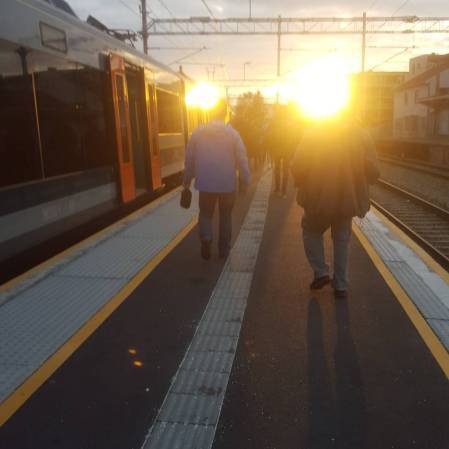 photo: Ren Powell
photo: Ren Powell
November 2, 2021
From Branch to Branch
I told the doctor yesterday that I was sleeping just fine.
And on cue, the insomnia creeps in. Awake at midnight, counting down the hours left to get some sleep. It’s a familiar habit from years ago. “If I fall asleep now, I can still get four hours… three hours and 34 minutes…. three hours and 5 minutes…”
Rumination.
Running this morning past the empty fields (the cows long since tucked into the barns for the winter), I ran through the morning mediation. I got to Right Intention. Which , of course, is to release: to stop clinging, clenching, grasping. I ran the fingers of my right hand over my left palm.
Let it go.
They say that a historical Jesus wouldn’t have been nailed through the palms, but between the bones above the wrists. But the icons with their bleeding palms make emotional sense to me. When we drink water from a stream, we cup it in our palms. When we beg, we gesture with the same cupped hands to show the emptiness that needs filling. When we approach, we show our empty palms to reveal our harmlessness. When we hold one another’s hands like a sacred map, this is where we find and read the heart-lines, life-lines and fates. If only just for fun. There is something inherently intimate about the palm. It is what a fist closes in on. Protects.
Whether or not it is holding something wise to protect. Or cling to.
I hold my arms loosely at my sides. Elbows bent and hands relaxed. I let go of yesterday’s perceived slights. I try to move through the morning without grasping.
At the beginning of the school year I bought myself a necklace. A silver gibbon. I intended it as a talisman for the monkey*-mind I want to acknowledge and help settle. This morning I’m thinking about real gibbons swinging through the trees, one hand grasping a branch, the other reaching and grasping at the next. And so on, through the rainforest – so quickly it looks like flying, but that’s an illusion: there is this thing. There is the next thing.
I think there’s a lesson here. Or at least a metaphor. We need things to cling to. And we need the reaching and soaring in between. Each in its own time.
Reaching the edge of the lake I turn back towards the house. I am at the part of my meditation where I hum “ni“: Discernment. I relax my hands, and I let go of yesterday’s perceived slights. Again.
*The gibbon is actually an ape, I know… but so am I.
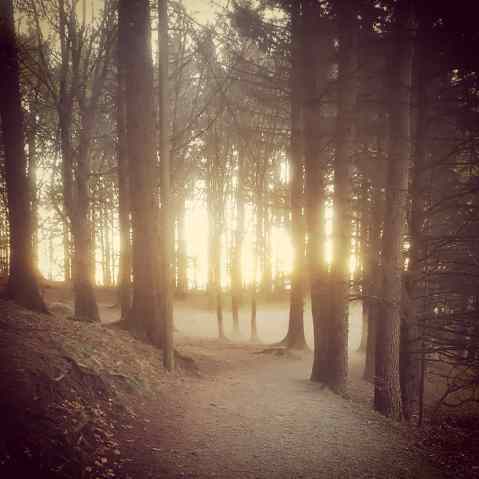
November 1, 2021
On Hubris. On Awe.
Yesterday I read a news article about the discovery of parthenogenesis in condors. Nature thumbing its nose again at everything we think we know – everything we humans have named and categorized and utilized to give us a sense of control.
For a few months of my junior high school years, I attended a school that had the condor as its mascot. I think I remember because they seemed such an odd choice. Such an inelegant bird. Those were the days of Vanderbilt jeans and those – and so much hope in ugly duckling stories.
Who would aspire to be a condor? A carrion-eater. A vulture. Crippled by DDT. Zombie-like. Or maybe our inspiration for Zombies?
When I was in college, my then-husband J. was driving to a dig in the mountains and his truck collided with a vulture, whose body burst against the windshield. J. spoke for weeks after about the smell he shouldn’t shake from his nostrils.
Death frightens us so much that it seems perfectly fitting that condors would then disturb us with their insistence on life. And if we pull away – if we approach again like children who put everything in their mouth, who make no judgments based on social cues, on categories of good and bad? We might see hope.
Which I suppose is a different kind of beauty.
I think there is both hope and beauty in our powerlessness. There is awe.
I am summing up the chapter on Greek Theatre this week. Looking at the overriding themes that we can see in what we can piece together from so long ago. It seems to me that hubris is important. That respect for the gods, for the autonomy of the universe in terms of human will, are both key if we are to avoid tragedies.
Are we not in awe of ourselves to our own demise, now as then? As may well be human nature? Which is tragic?
There are, though, always the characters – the old and wizened – who have surrendered.
In awe.
Strange that they are never the protagonists of our stories.
 The Bacchae in 8 minutes.
The Bacchae in 8 minutes.
October 31, 2021
The End of Exceptional Days
Leonard is curled up on the rug. Most of him is on the rug. His head is on the wood flooring where it is cool. It’s a quarter to seven and we’ve walked around the block, meditated and yoga-ed, and I ran along the lake in the rain.
It feels like coming home.
I am letting go of the anxiety. The state of “braced for bad news”. Too rigid, I broke under the strain. And that is okay. We break. And we heal. Again and again. Not always stronger. But who said strong was the goal? Supple is an odd word. I don’t care for the sound of it, but it is the right word. Perhaps trying to use physical metaphors to describe the psyche is all wrong anyway.
The wind is blowing this morning. The clouds are lit by the greenhouses. Light pollution, yes, but it means I can see the wind in the sky. I can see the great burlesque of stars covered and dis-covered. Just a bit of the old Hunter’s Moon visible in the dark. Fully present, regardless.
The real world outside ourselves is both ephemeral and eternal. If not the world, than the universe. If not the universe, then whatever it is that has no need to be “strong”. No need to measure existence in successes and failures.
A colleague’s toddler has Covid. And we are scrambling to find the latest guidelines. National. Local. I pull the box of masks out of the cupboard again. But this is no longer exceptional. It is no longer a state of emergency. It is.
These days are passing. From my perspective. The constellations moving. From my perspective. Leaves falling – fallen. Darkness closing in from both ends of each day. A space for deep work.
And it is time to stop thinking about all of this uncertainty, this grief, these fears as a kind of time-out.
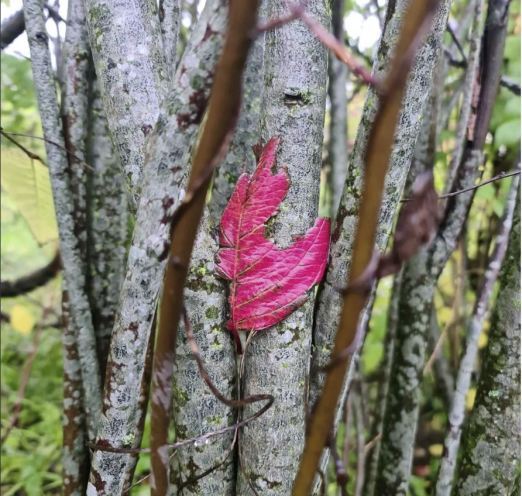 photo: Ren Powell
photo: Ren Powell a red maple leave against a thin tree trunk
October 30, 2021
Watching in the Dark
Tonight we should be able to see the aurora borealis. There is a website with the forecast, but this part of the country isn’t included there. We are too far south of the arctic circle. Today, however, there is a solar flare and the sky is supposed to dance all over Europe. I’ve got an eye on the window. Watching the clouds. The sun sinking.
Last night I met with L. What should have been a leisurely dinner, had I not been so hungry for injera and chilies. She actually told me to slow down. Take a breath. She’s feeling grief now, flowing in like a tide. She’s aware of her own breathing. Her mother-in-law has been moved to palliative care. A matter of days. A matter of hours. The kind of uncertainty that crowds the present with future sorrow. We are both twisting and untwisting – in varying tempos. She’s having trouble sleeping. I understand.
After dinner, we went to see Elizabeth Schwartz dancing several of Isadora Duncan’s works. Schwartz began studying Duncan’s work in 1977. Before that she studied under Merce Cunningham. She is now 72.
She performed the pieces first with music, then with a narration of words to describe each movement: wave, wave, sustain, splash… Then again. With music.
She wore Duncan’s thin, Grecian dress. Two tears in the front panel, running up along her thighs. She desired. She reached-toward. Then she skipped, hopped, arched her back and surrendered. A bacchae, a mother, a comrade. She is exhausted.
Her body wore years of experience, a wisdom in the movements, an aesthetic in the presentation that touches deeper than ornamentation: This is not for you. It is more than you can conquer. It has already survived you and your desire to possess. It beat you to it. Mocks you for your tiny reach. Tiny desires. It is a glimpse of your future. Your impotence.
Doesn’t that scare you? Doesn’t she scare you?
The indigenous people of the Pacific regions say that humans walk backward into the future. I don’t think they mean that as a criticism. Though I do.
I write. Glancing towards the window occasionally. One thought for next week’s doctor’s appointments. One reminder to pull my shoulders back and lock the root – mula bandha for a moment. Breathe. Hum. Ah-men. So be it.
A new thought: L.’s mother-in-law is 72.
Duncun did not dance at 72, her bones were bare in the grave by then. What we get – what we leave from this life is so arbitrary.
I’ve been thinking a lot about the question: Who tells your story? And whose story do you tell?
There were about forty people in the audience last night. And when invited, about a third of them took to the stage to learn one of the dances. To make it theirs. As usual: I observed. And I found myself close to tears at this play-acting of what used to be the transference of memory – long before film, before Laban notations. When memory was a living entity that evolved in the physical, metaphysical transference. When it wasn’t faithfully preserved as a single story mediated by the cognitive abilities of a single brain. When gods were greater than humans. Myths greater than fame.
Maybe that time never was at all. Maybe this is my pathetic recognition of mortality, a pathetic still-longing for a union with something lasting.
Meanwhile, I prepare for this year’s production, an adaptation of Maeterlinck’s Blue Bird. I am trying to stay in the moment of flow. “Yes, and…” I say to myself, acknowledging all that washes in (the doubts, the obvious) without becoming overwhelmed. Trusting. Wondering at the Blue Bird‘s diamond hat that allows the children to see the living soul of everything on earth. Water’s wantonness, Fire’s temper. “The soul of sugar is no more interesting than the soul of pepper”, says the fairy. But what of our souls, I wonder?
There is a line from the original Blue Bird just as the trees of the forest, and the animals – domesticated and not – distraught and desperate move to kill the humans in an act of vengeance and self-defense, Light advises the frightened child: “But, my poor boy, didn’t you know?… Turn the diamond! They will return into silence and obscurity and you will no longer [need to] perceive their hidden feelings.”
In other words: Walk backward into the future.
But no. I’m going to look. Even when the darkness comes – with the aurora borealis, whether I see it or not.
Every story ends, is picked up, and reborn.
Right?
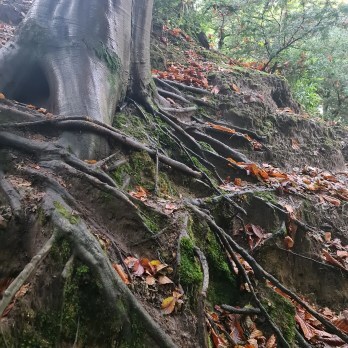 photo: Ren Powell
photo: Ren Powell
October 24, 2021
Facebook is not a Village
Last year when I was trying to market books, I added to my Facebook friends list anyone who hit that button to request. And since then I joined a few groups with huge numbers. Both were a mistake.
The world-wide-web may reach the world, but there is no universal context, there are no cultural norms. Many Americans assume everyone posting is in America. (I am actually kind of grateful for this continuous little nag because of what it has taught me about my own privileges and cultural myopia.)
When I posted a while back about my acute complex grief, I received dozens of private messages from other people about their own grief. Weird how that personal contact – which feels like whispering – can make one feel simultaneously less alone & more ashamed. It was overwhelming.
I have been sorting out what I wanted with that post – why I chose to reveal so much on Facebook and not here. I think it is because of the illusion of anonymity on Facebook – the inconceivable number of posts. It is something of a gamble – to slip out a word and see if anyone catches it.
This past couple of months one of the people whose posts are in my feed (no doubt because I have hit “care” often – though commented only once) has been going through unimaginable trauma. And with a kind of Aristotelian dramaturgy. We’ve reached the high point.
When this person’s posts appear in my feed I have to remind myself that this narrative is real – in real-time – and I am thinking to “unfriend” because in a real-life situation I would note the actual friends kneeling next to this person, comforting and I would know that I needed to take my empathy elsewhere to put it to good use. I would know the social context and respect my place in the community.
But then – to “unfriend” or even unfollow – to look away – seems wrong as well. This isn’t something that hasn’t been talked about before, I know that. But it seems people often fall on a “side” of blaming “oversharing” or judging one another in other ways – for their lack of mastery over the cultural norms on the world-wide-web, according to their personal understanding of the norms. Or there is… pity. Assumptions of ignorance, naivete, or helplessness. Either way – a rubric that one holds to for one’s own comfort.
If I remember the pop-science correctly, the average person has 5 good friends. And the capacity for about 150 names and faces that are meaningful to them. And an insatiable need for renown.
It seems like I used to see my friends’ posts in my feed. Now I see every post a friend comments on in my feed. I see sides of these people they may not wish to show me. I see new names and faces and opinions that are fed through in exponential numbers. I am thinking of the old Organics shampoo commercial: “…and they’ll tell two friends, and so on, and so on…” I am thinking of the exponential element of outrage, contempt -and the distortion of information (that I have participated in so often it is difficult to admit to myself). About the human nature to judge – quickly. About the sense of urgency and speed and the need to stay “relevant” culturally, even when that means jumping the gun in terms of facts.
One of the classes I teach is Theater Ensemble. The various organizational models – hierarchies and flat structures. And my personal belief is that as primates we can never move away from a hierarchy. If we are lucky the hierarchy structure shifts continually in the social process, but we are not The Borg. (Yeah, most of my students have no idea what that is a reference to because we do not have a common cultural inheritance. But I haven’t heard of a truly flat structure in nature.)
One year in Theater History, I stupidly stumbled into a discussion about the “facts” of theater history being theories. And that theories can change with new information – thus changing the “fact”. But I can’t get it out of my head that even though I know the hard sciences work this way as well, I want something to be a real – hard & true – fact. Not something made true by the loudest voice, or the most votes.
This fact today: from where I stand, the Hunting Moon is waning in the pale morning sky. The wind is blowing. Leonard is sleeping by my feet. I am yearning for all the vague atmosphere that the word village brings to mind. I want to live there.
And I want this person in my Facebook feed to be comforted somehow. By someone real. To be held – not in thoughts – but in body.

